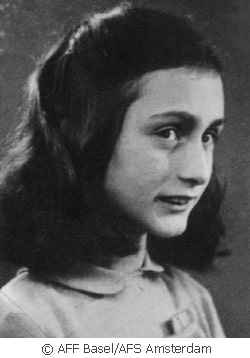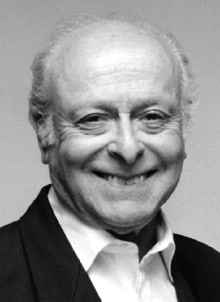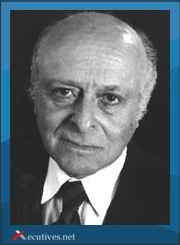Buddy Elias is the stage name of Bernhard Elias, born 1925 in Frankfurt am Main Germany. In his youth he attended the theater school of the Basel Conservatorium and also took drama lessons under Ernst Ginsberg. From 1947 to 1961, he was resident comedian for the ‚Holiday on Ice‘ revue. Along with innumerable appearances onstage in Switzerland, Germany, France and England, Buddy Elias appeared in some 80 films and TV- programs. He worked with such directors as Peter Zadek, Peter Lilienthal and Michael Verhoeven. Buddy Elias is the last living cousin and direct relation of Anne Frank – this has deeply affected his life. Since 1996, he has been the president of the Anne Frank Fund in Basel and administers the copyright on ‚Anne Franks Diary‘. Talking to Christian Dueblin, Buddy Elias recalled the highlights of his career as an actor and his experiences in Hollywood. He also talks about his family and the role of Switzerland in World War II as well as his hopes for the future.
Dueblin: Buddy Elias, in the bookcase of my parents there were several books dealing with World War II. The main topic was the discovery of the atrocities visited upon the Jews and other ethnic groups and coming to terms with these past horrors. On the same shelf there was a book of Jewish humor with Jewish jokes. As a child I looked at these books and could not understand the stark contrast. People professing the Jewish faith had to suffer immensely in the course of the last century. Nevertheless – or perhaps because of this – there are so many Jewish jokes – and the Jewish Klezmer music virtually explodes with jubilant optimism. As an actor and comic how do you explain these extremes?
Buddy Elias: Jewish humor is indeed unique and, as you yourself have remarked, is intricately connected to the history of the Jews. But one must distinguish two important aspects of Jewish humor. Firstly, there are jokes about Jews. These jokes are disgusting, and, considering the historical events of the past, they are in abhorrent bad taste. Then there are Jewish jokes, created by Jews, expressing their take on life. These are truly humorous and unique in their flavor. These jokes helped the Jews to survive the appalling persecution they suffered during the past centuries. Their humor is, in some aspects, a contradiction of their fate as Jews. The Jewish joke reflects the enormous tragedy of the Jewish people. It is subtle and, commonly, quite self-critical. I will tell you a joke which is typical for this type of humor: An SS-man in a concentration camp says to a Jewish inmate: ‚lf you can tell me which of my eyes is a glass eye, then you may leave the camp as a free man.‘ The Jewish prisoner says, without pause for thought: ‚Your left eye is the glass eye.‘ The SS-man reacts showing his irritation and asks: ‚How could you be so sure so quickly?‘ The Jew replies: ‚It looks so human‘. It is not the type of joke that makes you laugh out loud. You smile a little but at the same time you feel the deep melancholy that the joke conveys.
Dueblin: You yourself experienced World War II and lost a part of your family. How do you view Switzerland with regard to the war and the way in which the Swiss relate to this period in history?
Buddy Elias: There were two extreme positions. On the one hand, there were people in Switzerland who sacrificed much for the good cause. That is something I shall never forget and I am deeply grateful to these people. I am thinking of people like Paul Grüninger or Gertrud Kurz, who saved many lives – and not just Jewish lives. On the other hand, there were a number of people who did not react correctly. I disapproved of the politics of such influential people as Heinrich Rothmund or Eduard von Steiger. According to these people, there was a danger that the country could become judaicized. This opinion was shared by many ordinary people and, as we know, this led to much suffering.
Dueblin: Based on the revised figures produced by Carl Ludwig, the newspaper Neue Zürcher Zeitung reported on December 27th that Switzerland allowed far more persecuted people to enter the country than is popularly believed. What do you say to these figures and how do you regard the discussions regarding the updated figures?
Buddy Elias: I can’t really judge these figures. Of course, many people were admitted to this country. However, many were extradited and were later killed. The majority of those people who arrived at the border, but were not admitted, were later murdered. In my opinion, the ‚boat‘ was never ever full, as was claimed. It was a period of great uncertainty. We Jews in Switzerland were extremely fearful, because we knew that if the German army entered Switzerland, we would most certainly be killed.
Dueblin: You have philosophized on the fate of the Jewish people and their history all your life, yet you yourself are not a practicing Jew. You have always argued for public tolerance and religious freedom. What is your explanation for the repeated outbreaks of Anti-Semitism in so many areas throughout the world?
Buddy Elias: It all started with the murder of Jesus Christ. Anti-Semitism is already many centuries old and for many ethnic groups is a very strong and dynamic force. People have always looked for a scapegoat and often it was the Jews who were blamed. It is interesting that most anti-Semites have never met a Jew in their lives. I myself am not a typical Jew and I have never ever been discriminated against. Sometimes when I am travelling by tram, I see orthodox Jews and notice how the other passengers react to them. I quite often observe a certain rejection, but also anxiety in the eyes of the others. There is an inherited anxiety of the unknown deep within us humans. I notice this same pattern of mistrust with regard to Muslims in our time.

Anne Frank, © ANNE FRANK-Fonds, Basel / Anne Frank Stichting, Amsterdam
Dueblin: As president of the Anne Frank-Fund, you manage the rights to the ‚Diary of Anne Frank‘, your cousin, who was murdered in 1945 in the Bergen-Belsen concentration camp. For many years now, you have been giving talks to schools and talking to young people about the fate of the Jews. How do you explain the fact that young people still find this book of enormous interest?
Buddy Elias: Just today, I received some post from a Canadian school class (He shows a great pile of essays, poems and letters intended for Anne Frank). The class has read the ‚Diary of Anne Frank‘ and watched a documentary about her life. The children then set to and wrote poems and texts relating to the book and items addressed directly to her. So far I have not had time to read all their efforts. But it pleases and touches me deeply that young people are still critically appraising the life of Anne Frank and the historical period of her life and death. Anne Frank and her life really interest people immensely. Something like 40 million copies of the book have been sold. In Japan, Anne Frank is practically regarded as a Saint. The book is a historical document that goes to the heart. It is a very touching document. During World War II six million people were murdered. It is very difficult to fully appreciate the enormity of this figure. The book, however, describes the fate of just one young girl. Anne received the diary on her 13th birthday. Just one month later she had to go into hiding. And it was in this hideaway that she began to write her diary. The diary ends on August 1, 1944. In March 1945 she was murdered. With the proceeds from the sale of the book we support people all over the world, including Switzerland, – and have been doing for many years. We support organizations that promote peace and unity among the peoples of the earth, as well as projects designed to help children in need. In Israel, we only support organizations that work together with the Palestinians
Dueblin: Buddy Elias, I would like to talk to you about your career as an actor, which has had a strong influence on the course of your life and given you great satisfaction. You made a big name for yourself as an actor. Your filmography, and the list of theater productions you have appeared in, is a mile long. Which productions have had a particularly strong influence on you – which performances do you recall with pleasure?
Buddy Elias: That is a difficult question. I have produced a lot of material for television. But I have not made many films for the cinema. Working on the series ‚With Heart and Soul‘ (‚Mit Leib und Seele‘), in which I was acting alongside Günter Strack, was a very pleasant time. Günther Strack and I were close friends. He was a brilliant actor and a wonderful person, whom I greatly admired and now miss terribly.
Dueblin: Did you come into contact with ‚Hollywood‘ in the course of your life?
Buddy Elias: (Laughs) Yes, I just kind of lightly brushed Hollywood, so to speak. I had some contact with Steven Spielberg. In the film ‚The Magician of Lublin‘ with Shelley Winters and Alan Arkin, I played a supporting role. Playing a small part in the film ‚Sunshine‘ I had the pleasure of getting to know Ralph Fiennes and Rachel Weisz. Those were some of the most exciting moments.
Dueblin: What would be your dream role, if you could choose?
Buddy Elias: A dream role that I would still like to play? No, that is behind me now. Many years ago, a dream role was offered to me. I had the opportunity to play Cyrano de Bergerac in Berlin on the stage. Unfortunately, I had a commitment in Mannheim that I could not drop, so I was unable to accept the part. Cyrano de Bergerac is a character I would have loved to perform. A very personal dream role was playing in ‚The Canterbury Tales‘ in London. That for me was the pinnacle of my acting career. At the moment I am playing at the Theater Fauteuil in Basel in a piece called ‚Would you care for a little more?‘ (‚Darfs e bitzeli meh si?‘.) That is a part that also makes me very happy. It is a rather weird story about a man who slips into various roles in order to get cash from the Social Security. However, this constant change of personality gets to be too much for him. The play has been a great success so it will run again in March 2008.

Buddy Elias © Familienarchiv Elias, Basel
Dueblin: Buddy Elias, you are without a doubt, a native of Basel; a true ‚Basler‘. Recently you were awarded the 13th Basler-Stern. (Star of Basel Award). May I congratulate you, also on behalf of Xecutives. With this award you join the ranks of the cream of Basel society along with, for example, Christian Gross, Vera Oeri and Hildy und Ernst Beyeler.
Buddy Elias: Yes, I feel deeply honored receiving this award. I am very pleased that so many people like me and appreciate my work. I grew up in Basel and I am very proud of my town.
Dueblin: What would you wish for the people of Basel and Switzerland?
Buddy Elias: (Reflects for a while) Peace, of course; peace and humanity to all. That is the most important thing in the world. Racial discrimination must be eradicated. We must fight again and again against this irrational fear of strangers. I also wish myself good health and many more pleasant years together with my wife. She is my life! We have been married for 43 years. Nothing in my whole life has given me more happiness than being with my wife and fulfilling my role as her husband. Perhaps I might accept the odd part in a TV drama. Apart from that, I would like to advise and support my two sons in their activities. Both of them are actors and my son, Patrick, helps and supports people in need in a very special way. Those are my wishes for the future.
Dueblin: Buddy Elias, many thanks for this conversation and may I wish you, also in the name of Xecutives, continuing happiness and success in your projects.
(C) 2008 by Christian Dueblin. All rights reserved. Translated from the original German by Michael L. Wilkinson, Binningen, Switzerland
_________________________
Links:
– Wikipedia
– ANNE FRANK-Fonds, Anne Frank.org, Wikipedias biography of Anne Frank
– Portrait of Patrick Elias







